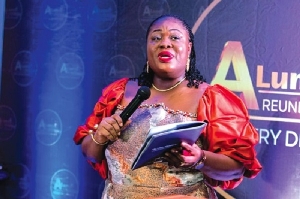A former Deputy Attorney General and Minister of Justice, Diana Asonaba Dapaah, has challenged the assertion that President John Dramani Mahama exercised discretionary power in suspending the embattled Chief Justice, Gertude Torkornoo, amid the process of her proposed removal from office.
She rather argued that the action was a breach of the 1992 Constitution as it expressly requires the exercise of the provision to be executed in fairness – an aspect she believes President John Mahama side-stepped.
Speaking in an interview on Asempa FM’s Ekosii Sen, Asonaba Dapaah stated that it appears the president acted out of prejudice.
She consequently rejected claims that President Mahama had followed due process, insisting that his actions rather violated the constitutional provision.
“I do not agree with anyone who says the president used due process to remove the Chief Justice. I believe President Mahama has sinned against the constitution,” she stated..
She cited article 146 (10), which states that – where a petition has been referred to a committee, the President may– (a) in the case of the Chief Justice, acting in accordance with the advice of the Council of State, by warrant signed by him, suspend the Chief Justice.
“The word ‘may’ as expressed in the constitution suggests that it is not absolute. It can be subject to review. So, the argument that the president is following due process is flawed,” she argued.
She highlighted fairness as a crucial element in the exercise of discretionary power by the president, citing Article 296 of the 1992 Constitution.
The law, under Article 296 of the 1992 Constitution or in any other law discretionary power is vested in any person or authority – (a) that discretionary power shall be deemed to imply a duty to be fair and candid; (b) the exercise of the discretionary power shall not be arbitrary, capricious or biased wither by resentment, prejudice or personal dislike and shall be in accordance with due process of law; and (c) where the person or authority is not a judge or other judicial officer, there shall be published by constitutional instrument or statutory instrument, regulations that are not inconsistent with the provisions of this Constitution or that other law to govern the exercise of the discretionary power.
“Again, the provision for discretionary powers by the president per the law must be done in fairness and I believe that provision was blatantly overlooked in Justice Torkornoo’s case,” she argued.
It was on these grounds that she vehemently rejected the argument put forth by some lawyers that the president acted within the law to suspend Chief Justice Gertrude Torkornoo.
https://www.facebook.com/watch/?v=2014056569089403
VPO/AE
Meanwhile, catch up on the concluding part of the story of Fort William, where children were sold in exchange for kitchenware, others, below:



